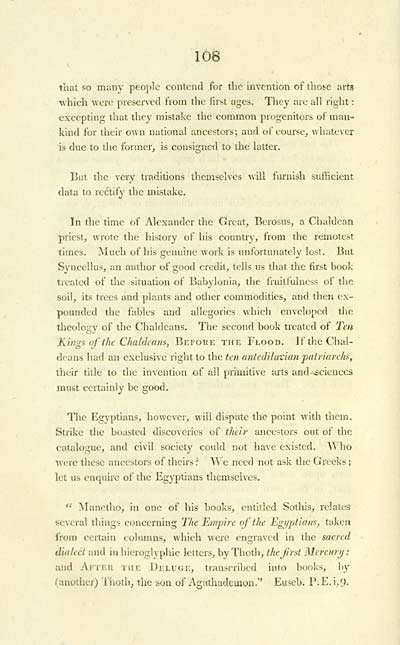Blair Collection > Celtic researches, on the origin, traditions & language, of the ancient Britons
(198)
Download files
Complete book:
Individual page:
Thumbnail gallery: Grid view | List view

108
that so many people contend for the ίηΛτηίίοη of thof-e arts
which were preserved from the first ages. They are all right :
excepting that they mistake the common progenitors of man-
kind for their own national ancestors; and of course, whatever
is due to the former, is consigned to tlie latter.
But the very traditions themselves will furnish sufficient
data to reétify the mistake.
In die time of Alexander the Great, Berosus, a Chaldean
priest, wrote the history of his country, from the remotest
times. ]\iuch of his genuine work is unfortunately lost. But
SyncelluSj an author of good credit, tells us that the first book
treated of the situation of Babylonia, the fruitfulness of the
soil, its trees and plants and other commodities, and then ex-
pounded the fables and allegories which enveloped the
theology of the Chaldeans. Tlic second book treated of Ten
Kings of the Chaldeans, Before the Flood. If the Chal-
deans had an exclusive right to the ten antedilutian patriarchs^
their tide to the invention of all primitive arts and -sciences
must certainly be good.
Tire Egyptians, however, will dispute the point with them.
Strike the boasted discoveries of their ancestors out of the
catalogue, and civil society could not have existed. \s ho
■were these ancestors of theirs ? We need not ask the Cireeks ;
let us enquire of the Egyptians themselves.
" Manedio, in one of his books, entitled Sothis, relates
several things concerning The Empire of the Egi/ptians, taken
from certain columns, which were engraved in the sacred
dialeci and in hieroglyphic letters, by Thodi, the first Mercmy:
and Afteii the Deluge, transcribed into books, by
(another) 1 noth, the son of Agathademon." Euseb. P. E. i,9.
that so many people contend for the ίηΛτηίίοη of thof-e arts
which were preserved from the first ages. They are all right :
excepting that they mistake the common progenitors of man-
kind for their own national ancestors; and of course, whatever
is due to the former, is consigned to tlie latter.
But the very traditions themselves will furnish sufficient
data to reétify the mistake.
In die time of Alexander the Great, Berosus, a Chaldean
priest, wrote the history of his country, from the remotest
times. ]\iuch of his genuine work is unfortunately lost. But
SyncelluSj an author of good credit, tells us that the first book
treated of the situation of Babylonia, the fruitfulness of the
soil, its trees and plants and other commodities, and then ex-
pounded the fables and allegories which enveloped the
theology of the Chaldeans. Tlic second book treated of Ten
Kings of the Chaldeans, Before the Flood. If the Chal-
deans had an exclusive right to the ten antedilutian patriarchs^
their tide to the invention of all primitive arts and -sciences
must certainly be good.
Tire Egyptians, however, will dispute the point with them.
Strike the boasted discoveries of their ancestors out of the
catalogue, and civil society could not have existed. \s ho
■were these ancestors of theirs ? We need not ask the Cireeks ;
let us enquire of the Egyptians themselves.
" Manedio, in one of his books, entitled Sothis, relates
several things concerning The Empire of the Egi/ptians, taken
from certain columns, which were engraved in the sacred
dialeci and in hieroglyphic letters, by Thodi, the first Mercmy:
and Afteii the Deluge, transcribed into books, by
(another) 1 noth, the son of Agathademon." Euseb. P. E. i,9.
Set display mode to: Large image | Transcription
Images and transcriptions on this page, including medium image downloads, may be used under the Creative Commons Attribution 4.0 International Licence unless otherwise stated. ![]()
| Early Gaelic Book Collections > Blair Collection > Celtic researches, on the origin, traditions & language, of the ancient Britons > (198) |
|---|
| Permanent URL | https://digital.nls.uk/75766060 |
|---|
| Description | A selection of books from a collection of more than 500 titles, mostly on religious and literary topics. Also includes some material dealing with other Celtic languages and societies. Collection created towards the end of the 19th century by Lady Evelyn Stewart Murray. |
|---|
| Description | Selected items from five 'Special and Named Printed Collections'. Includes books in Gaelic and other Celtic languages, works about the Gaels, their languages, literature, culture and history. |
|---|

